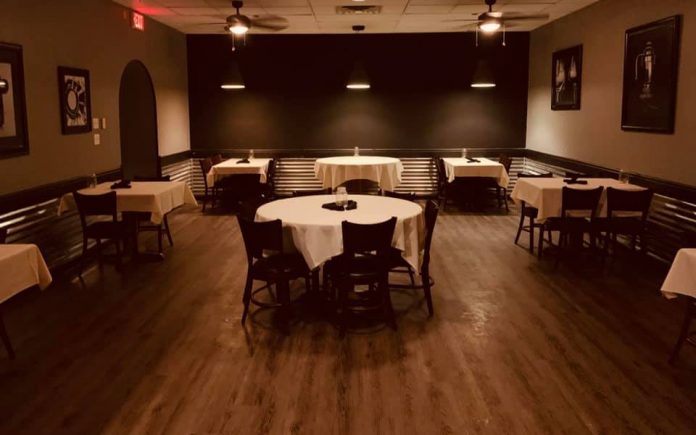When Bucks County entered the coveted “green phase” of Gov. Tom Wolf’s reopening plan on Friday, June 26, Jim Murray was excited. After months of surviving purely on takeout sales, his restaurant Tre Fratelli could finally welcome patrons inside the dining room…until it reached 50 percent capacity, of course.
“I thought we were gonna be packed. I thought that people couldn’t wait to get out,” Murray said, adding how he turned down a family trip to the beach for the occasion. “We brought a full staff on. We were prepared for the busiest Friday that we’ve had in years.”
But the big “welcome back” envisioned by Murray didn’t happen. Tre Fratelli, located in Langhorne’s Summit Square Shopping Center, filled three tables that night. And neighboring restaurants didn’t do any better.
When asked by an employee at the next-door UPS Store how everything went, Murray expressed his frustration and surprise at the lack of customers. The employee, a longtime Tre Fratelli-goer, told Murray she has no plans to enter an indoor restaurant for the foreseeable future. Until COVID-19 goes away, she refuses to willingly put herself in an enclosed space with strangers.
“I needed her to tell me that because I wasn’t thinking that way. In my mind, I was thinking people can’t wait to get out. They can’t wait to go out and eat,” Murray said. “I love when I’m told something that I don’t know, and I didn’t know that.”
Learning this information was a blow to Murray, who now understands that much of the population feels the same as the UPS employee. Still, things began to look up in early July, when the restaurant was booked every weekend through September for baby and bridal showers.
Everything seemed great. That is, until Wolf decreased the maximum capacity from 50 to 25 percent. Since this includes staff, Murray explained that under the new mitigation order, Tre Fratelli could welcome 19 guests. Naturally, almost every shower had to be canceled.
“I’m back to being a little bit depressed and I don’t know what to do. You staff up, you put inventory up, and then it all changes at a moment’s notice on a whim,” Murray said. “Everything just seems so random, and I don’t think the governor understands that these whims are destroying businesses. Destroying them. The one thing I was counting on were those parties, and now 90 percent of them are canceled.”
While Murray has the option of offering outdoor dining, he does not have the funds to afford the outdoor setup, which he said can cost nearly $30,000. He also fears the risks it involves, including an individual or car being hit with an umbrella or table on a windy day.
“We’re in a situation that’s so temperamental and I’m teetering on staying in business, that something like that is going to destroy me,” he said. “Is it worth taking another chance for something that might not pan out, when we’re in the hazy days of August and it’s going to be 98 degrees? I don’t want to sit outside in a parking lot when it’s 98 degrees.”
According to Murray, the situation for many restaurants is bleak. Although the fall months typically see an increase in business, as has always been the case since Murray entered the industry 22 years ago, he strongly believes 2020 will be a different story.
“I don’t think it’s going to happen this year. That is what really scares me. I can maintain for a short amount of time. I think a lot of businesses can. But this is not a short amount of time anymore. We’re in six-month territory right now,” he said. “This is why government and business don’t mix. The government can say and do whatever they want.”
A hot-button issue for Murray is how state grants are distributed. He said more emphasis is placed on profit rather than revenue, which is not ideal for Tre Fratelli.
“When this COVID thing happened, we went straight to takeout. We were the only game in town. We were doing a lot of volunteer stuff,” Murray said, reflecting on how he and his staff donated $100,000 worth of food to local nurses and police. “We did more revenue in April than we’ve ever done. Ever. It was the best month we ever had in sales.”
At the same time, Murray paid his waiters, waitresses and bus people more money to make up for lack of tips. Additionally, the cost of meat and dairy rose when the pandemic began. But Murray didn’t raise prices on the menu.
“Our revenue went up, but so did our expenses. I actually made in profit less money in those three months than ever before,” he said. “I’m very afraid that the next round of stimulus will only be for businesses that made no money. Yeah, because they were closed down. Closed-down businesses don’t make any money, but they also don’t spend any money. I forced myself to stay open. I took money out of my own savings to keep people employed. I worked like a dog. And then they’re going to turn around and say, ‘Your revenue didn’t go down so we’re not gonna help you out.’”
Murray understands many people are hesitant to be in an enclosed public space. But he hopes they’ll soon return to local restaurants, which, in many cases, desperately need support.
“I don’t know how to make them stop being afraid,” he said. “You have to be smart, but you also have to live your life.”
Samantha Bambino can be reached at [email protected]


